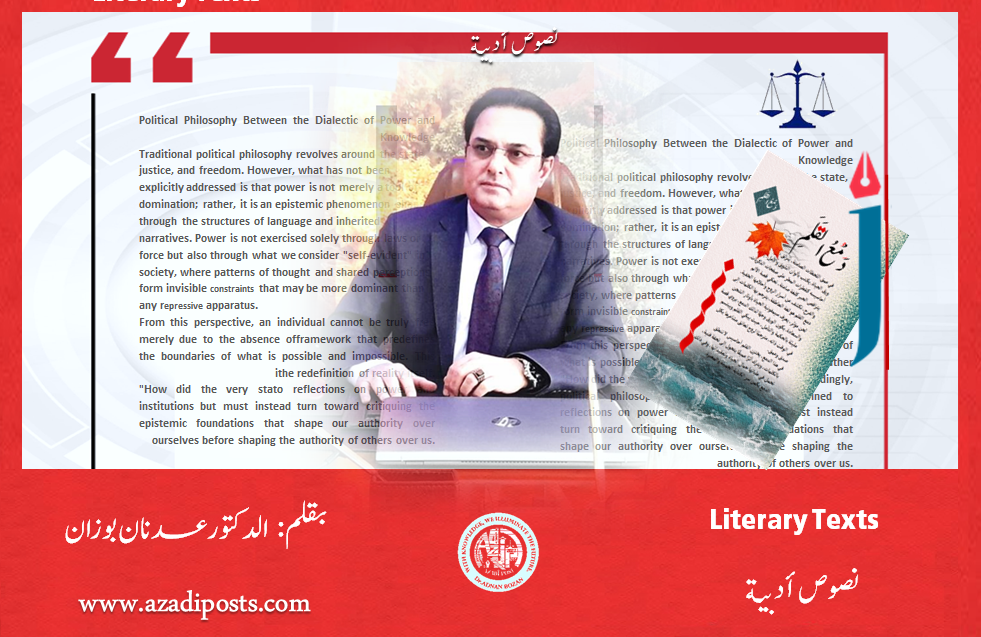
By Dr. Adnan Bozan
I was never a philosopher in the classical sense,
nor a writer lured by the glow of dictionaries or the charm of terminology.
I was always more like a man living in a corridor of mirrors—
each time he thought he had found his final face,
another image of himself would emerge—different,
more fragile, or perhaps more expansive.
I read Kant as an orphan reads the will of his absent father.
I read Foucault as a prisoner reads the memoirs of freedom.
And I stood long before Plato,
as a stranger stands at the gates of a city he cannot tell
if he ever left—or ever entered.
I read Al-Ghazali not to follow him,
but to search for the shadow he left behind
when his heart trembled between reason and revelation.
I read Ibn Rushd as one reads light at the center of a storm—
a light that doesn’t save,
but reminds you that the world is still there… somewhere.
I never intended to imitate anyone,
nor to reject them.
I merely borrowed their keys
to knock on doors they never meant to reach,
perhaps never imagined existed.
I flipped through their books
as a dreamer flips through the pages of his sleep—
not to recall what he dreamt,
but to understand why his heart still trembles
every time he closes his eyes.
They all taught me how to think—
and then I forgot it all.
I forgot the paths they walked,
yet my footsteps still tremble
whenever I cross a new road.
I forgot their sayings,
but their echoes still resonate in my ears
as if they were my own voice—
a voice I have yet to speak.
I am a disciple of forgetfulness—
not the forgetfulness of ignorance,
but that of the wise one who realizes
that what remains in the heart
is not what’s written in the margins,
but what slips silently between words,
what is planted in the gaps between ideas,
in the silence that separates phrases,
in the stammering of expression,
in awe,
in what cannot be explained.
I learned from Ibn Sina
how reason rises amidst ruins.
From Al-Baqillani, how the argument speaks in the face of silence.
From Bachelard, how imagination can be truer than reality.
From Hume, how convictions may fall without the heart collapsing.
From Descartes, that doubt does not kill truth—it frees it.
And from Spinoza, that God is not a principle we worship,
but a system through which we liberate ourselves.
But when I write, I do not summon them.
I do not conjure their presence
like ghosts in lonely nights.
I do not write with their minds—
but with what remains of me
after their thoughts passed through my body
and left unnoticed.
I write with what filled me from them without being named,
what settled deep in my being,
like clay that cannot be washed away.
That which remains—
that cannot be recalled,
that I do not know when, how, or why
it formed in my depths—
is what gives me the right to speak,
and the right to be silent.
I am not a follower of anyone,
nor an heir to any doctrine,
nor a descendant of a single school of thought.
I am the grandson of the unknown,
the son of wandering questions,
the foster child of bewilderment.
I write because I can no longer endure silence.
I think because I don’t know how to live
without excavating meaning.
And perhaps, in the end,
all I ask is something simple—
and complicated:
to be a witness.
Not a prophet.
Not a teacher.
Just a witness to humanity’s passage
from one shadow to another,
without ever fully reaching the light.
All I know now
is that I’ve written much
without saying what I truly meant.
I’ve thought deeply
without knowing whether I was right.
I have loved words
as a thirsty man loves the illusion of water in the desert.
And yet,
every time I return to the page,
I feel something still waiting for me:
an idea yet unborn,
a sentence that slips away,
a meaning hiding
in the fracture of light
on a sleeping letter.
Perhaps I am no more than an echo
of voices that came before me.
And perhaps all that is unique in me
is the way I tremble
when I utter what they believed was self-evident.
I am their disciple, yes—
but a disciple who learned more than he was given,
because he forgot the lessons,
and began writing from forgetfulness itself